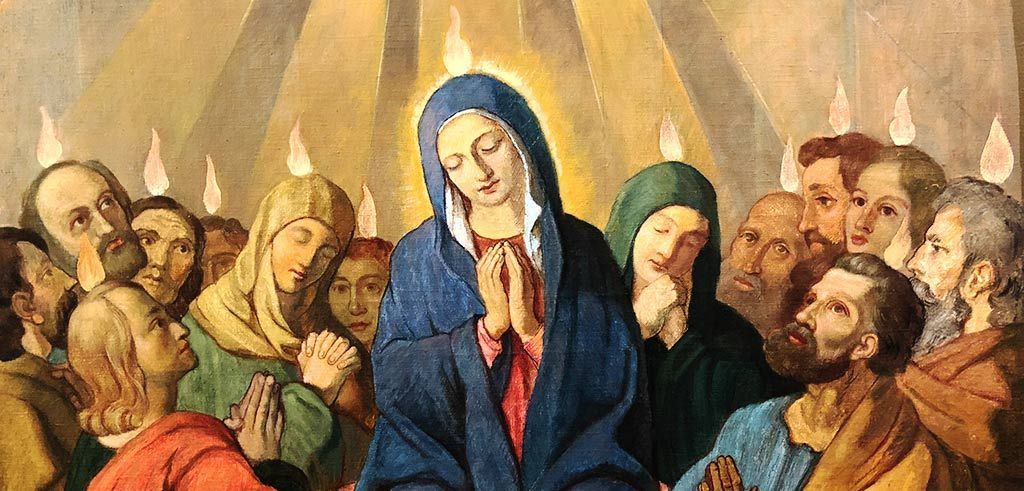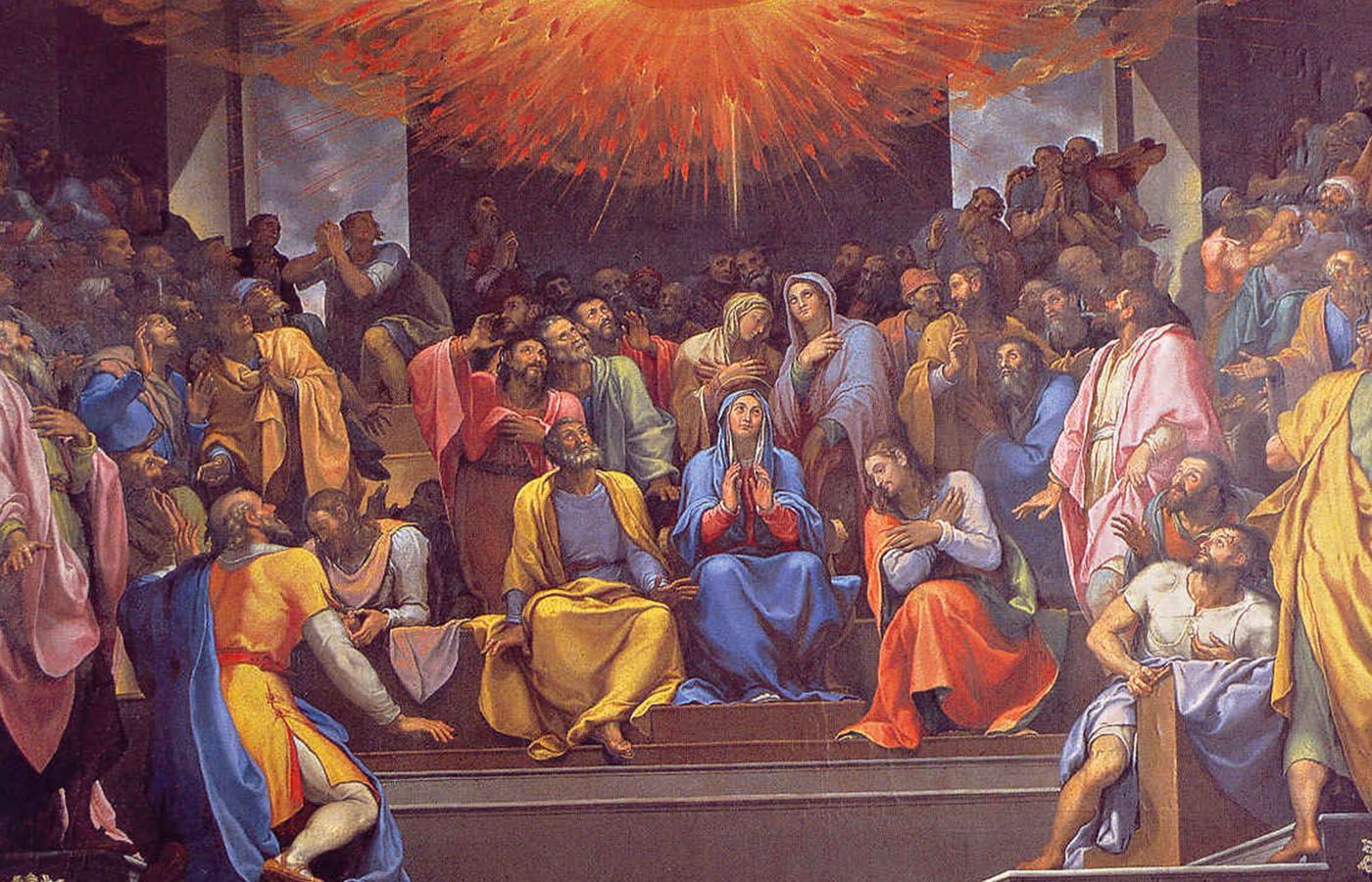In the Upper Room: How do I pray?
From a homily preached by Fr Brendan on the 7th Sunday of Easter, 2023
Chapter 17 of St John's Gospel is not an easy read. It is St John at his most dense and theological, in fact it has been called profound theological chapter of the Bible. At first it can be a bit overwhelming, with rich and dense ideas almost crashing together. Unlike us when we write, St John did not have bold, italic or underlining to emphasise what he wants to say, so what he does is have Jesus repeat things again and again and again in a sort of circular meditation our Lord’s most profound themes: glory, unity, truth and love. These are words from Chapter 17 of John’s Gospel are our Lord’s final words at the last supper. And it is a prayer.
I think it is why we always read a section of this chapter on the Sunday between Ascension and Pentecost. It is a window into the prayer life of Jesus. And in our first reading we have that beautiful picture of the Church gathered together with Mary the Mother of Jesus in continuous prayer.
How do you pray? How do we pray? If I am honest, I think most people here would say their prayer is very poor and inadequate. So I thought I would give a few simple pointers for prayer from the Scriptures and the liturgy that have helped me. First, three great Scriptural texts.
The first is Romans 8. St Paul says “The Spirit too comes to help us in our weakness. For when we cannot choose words in order to pray properly, the Spirit himself express our plea in a way that could never be put into words.” That for me is a great liberating text, because it recognizes that most of us feel that we cannot pray properly. But that doesn’t matter. All we have to do is to tune in to the Spirit is within us. Say “Come Holy Spirit pray in me.”
The Lord said to Julian of Norwich in her Revelations: “Pray entirely inwardly, though you think it savours you not. For it is profitable, though you feel not, though you see nought, yea though you think you might not, for in dryness and in barrenness, in sickness and in feebleness, then is your prayer well pleasing to me, though you think it savour you not but little.” Our poor prayer is pleasing to God. Let the Holy Spirit do the work. Just be like the disciples in the Upper Room waiting for the Spirit to come and do his work.
The second help in the Scriptures is the Book of Psalms. These are inspired prayers. The Psalter is the great prayerbook of the Church. How does it help me? They are real cries of real people. “The Psalms are the guts of those who know how to pray” says Origen, the great Church Father. They know the worst of grief and abandonment: “Out of the depths I cry unto you, O Lord.” “My God, my God, why have you forsaken me.” They know the heights of joy: “Let everything that lives and breathes, praise the Lord. Alleluia.” They have been there, wherever ‘there is’ they have known the best of times, the worst of times. And they help pray us through. “You have turned my mourning into dancing.” They put into words our feelings. They express our desires and hungers: “O God, you are my God, for you I long, that a dried wearied land without water.” “It makes one conscious that these are real prayers and aspirations uttered by real people” said C.S. Lewis. Just take a line from the psalms that helps you. Learn it and repeat it. What line strikes you in todays Psalm? When we are anxious: “The Lord is my light and my help, whom shall I fear.” Or a prayer of quiet longing: “Of you my heart has spoken: ‘Seek his face’.” Repeat a phrase like a mantra
The third help for me from the Scriptures would be St John's Gospel as a whole. We get a sense that the whole of the life of Jesus is a DIALOGUE between the Father and the Son. And the dialogue can be reduced to two simple words: Jesus says FATHER... and the Father says: BELOVED. And we can understand all prayer as entering into that Dialogue of love between the Father and the Son.
St John knew the other Gospels, and John 17 is seen as a profound meditation on the Our Father, and as such a window that allows us to gaze on the prayer life of Jesus. It allows us to listen in on his dialogue with the Father.
I wonder to whom do you normally pray? You might answer – “Well to God, of course!” But generally, we pray to God the Father, or to Jesus, or to the Holy Spirit? Perhaps it varies. But the liturgy is the model for all prayer. We learn to pray at Mass, from the prayers we hear and say, again and again. Have you noticed that the great prayers of Mass – the collect or opening prayer, the offertory and communion prayers – are normally addressed to God the Father. There are occasional exceptions, and prayers like that before Holy Communion: “Lord Jesus Christ, who said to your apostles.” Or “Come Holy Spirit.”
And the great prayer of the Mass – the Eucharistic prayer is addressed to God the Father. But through him, with him, in him, that is through Christ as our mediator, with Christ as our brother, in Christ as part of his body all is lifted up to the Father. In the unity of the Holy Spirit, in whom we gather. That is the basic structure of all Christian prayer. We pray in the Holy Spirit, through Jesus our intercessor and priest, to the Father the source of all blessings.
At this Mass, we gather in the Holy Spirit, and the worshipping community, Christ-in us, cries out FATHER in the Eucharistic prayer. And the Father whispers back ‘Beloved’ by making his beloved son present in our midst. And Jesus shares his life with us, we all share his glory.
When Jesus prays to the Father in John 17 what does he pray? He prays for us, because we belong to him. He wants the glory that the Father has given him to flow out to us. He wants the radiance of God’s presence to be alive in us. In simple terms, we matter to God. This is important to say because sometimes people think that they are unworthy; that they are just not good enough; not holy enough. The truth is that most of us aren’t. But the other truth is that it does not matter because – to quote St John – “God so loved the world that he gave his only Son” – or to quote St Paul - “Jesus loved me and gave his life for me.” “O Lord I am not worthy” we say before Communion. But only say the word. Well, the Father uttered the Word, and the Word became flesh, and dwelt amongst us and we beheld his glory. Beholding his glory we are made worthy, we are made glorious. Jesus does not merely want to dwell in or live in the believer, but to be glorified in them. Just enter into that dialogue of love between the Father and the Son.
Prayer is not easy. But all we do is put ourselves in the presence of God. It is not we who have to roll up our sleeves because it is the Holy Spirit who prays in us when we do not know how to pray. It is Jesus, our Saviour, or Intercessor, our High Priest who lifts us up to the Father. And the Father answers back. He sends out his glory, sends out his grace, sends out his Holy Spirit. All we need to do is be open to receive.
Like Mary at the Annunciation when the Holy Spirit came upon her. But now like Mary and the Apostles in the Upper Room, let us open our hearts in continuous prayer.
A recording of the homily is here at 26 minutes.











